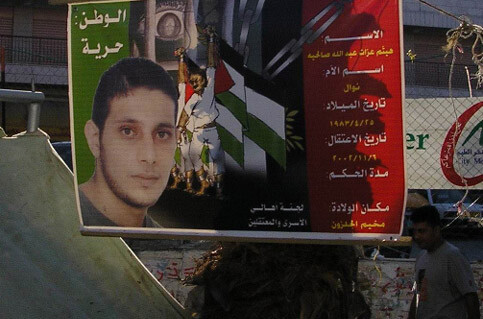Mandela Institute 2 September 2004

In an interview with Mandela’s lawyer Buthaina Duqmaq at Ha Darim Prison on 2 September 2004, inmates Houssam Khader and Samir Qanttar affirmed negotiations with the Israeli Prison Authority have actually begun on day one of the hunger strike contrary to what Israeli media has been reporting.
They asserted the popular and organized solidarity movement with the prisoners forced Israeli authorities into negotiations with the striking prisoners. Both inmates emphasized the prisoners’ high spirits to challenge the status quo and their coalescence with the committee leading the strike coerced the Israeli side into marathon-like negotiations to lessen the negative impact of the strike on Israeli image.
Khader and Qanttar affirmed the committee is made of the following prisoners: Sheikh Mohammad Abu-Tair, Tawfic Abu-Na’im, Houssam Khader*, Samir Qanttar**, Walid Daqqa, Yahia Senoir, Hassan Maqadmah, Younis Ershaid, Rouhy Mushtaha, Wael Fannouna, Taher Zayyoud and Abdul-Khaleq Natsha.
On 21 August 2004, Israeli prison authorities placed Tawfic Abu-Na’im, Houssam Khader and Mohammad Abu-Tair in solitary confinement at Ovik Prison. Their cells lack the basic minimum standards for human life. Other members of the committee were placed in two poorly-ventilated rooms and shed heavy spotlights at them.
Mr. Khader and Mr. Qanttar informed Ms. Duqmaq that Mr. Gibson, Head of General Security in the Israeli Prison Authority, Mr. Itzaq Jabay, Director of Prison Intelligence and the Commander of the so-called Southern Command –known as Nazim- and began negotiations with the prisoners’ committee. No agreements were reached. The Israeli authorities transferred the leadership committee to Jalama Prison.
Director of the Israeli Prison Authority, deputy and wardens of Israeli prisons came to meet the leadership committee at Jalama on 31 August 2004. The meeting lasted from 4:00 PM until 7:00 PM. An agreement was reached whereby the Israeli side agreed to the prisoners’ demands regarding improvement of humanitarian conditions. The Israelis promised to examine other demands which they consider of security
nature two weeks after the end of the hunger strike.
The Israeli Prison Authority agreed to transfer every committee member that was placed in solitary confinement back to the prison he was originally in to brief the prisoners of the outcome of negotiations. Accordingly, this part of the deal was executed on Wednesday 1 September 2004.
Following the transfer of inmates Khader and Qanttar to Ha Darim Prison, prisoners there decided to adjourn their hunger strike until Sunday 5 September 2004 but will continue o take liquids only. This decision applies to all Israeli prisons except Beer Shiva’ as its representative Tawfic Abu-Na’im and the Beer Shiva’ administration had failed to agree on certain issues during their meeting at Jalama prison. The HaDarim administration allowed Mr. Qanttar to telephone Tawfic Abu-Na’im to discuss the disputed issues. No agreement regarding adjournment of the strike at Beer Shiva’ was reported.
Following is a letter from inmates at Ha Darim Prison to the Arab and Palestinian masses engaged in popular and organized solidarity activities with the striking prisoners.
“The spirit of challenge and steadfastness which characterized our masses on the outside and the prisoners’ movement on the inside had proved that the prisoners’ will could overcome the policies of oppression and tormenting we had faced for years. We strongly declare that we did not stop our hunger strike but only adjourned it in order to start negotiations to improve the prison conditions and to ensure dignified living for our colleagues. We hope to reach a genuine understanding with the prison authority and close several files which if left open could trigger more strikes and could let an atmosphere of tension prevail”.
Related Links